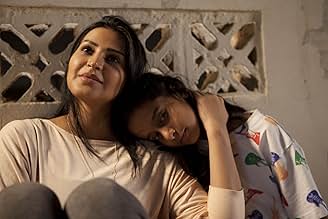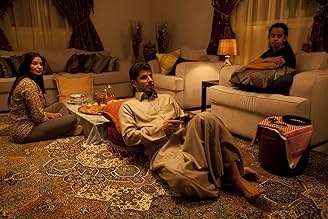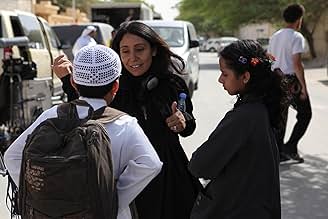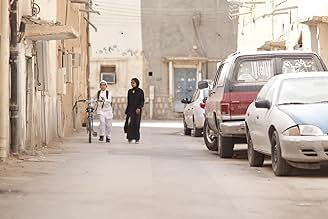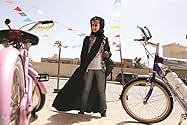CALIFICACIÓN DE IMDb
7.5/10
22 k
TU CALIFICACIÓN
Una niña saudita emprendedora se inscribe en la competencia de recitación del Corán de su escuela como una forma de recaudar los fondos faltantes que necesita para comprar la bicicleta verde... Leer todoUna niña saudita emprendedora se inscribe en la competencia de recitación del Corán de su escuela como una forma de recaudar los fondos faltantes que necesita para comprar la bicicleta verde que ha captado su interés.Una niña saudita emprendedora se inscribe en la competencia de recitación del Corán de su escuela como una forma de recaudar los fondos faltantes que necesita para comprar la bicicleta verde que ha captado su interés.
- Nominada a1 premio BAFTA
- 22 premios ganados y 36 nominaciones en total
Abdullrahman Al Gohani
- Abdullah
- (as Abdullrahman Algohani)
Sara Al Jaber
- Leila
- (as Sara Aljaber)
- Dirección
- Guionista
- Todo el elenco y el equipo
- Producción, taquilla y más en IMDbPro
Argumento
¿Sabías que…?
- TriviaThe first feature length film made by a female Saudi director.
- ErroresWhen Wadjda takes the bread out of the oven, mic equipment is visible on her waist, under her T-shirt.
- ConexionesFeatured in At the Movies: Venice Film Festival 2012 (2012)
- Bandas sonorasDead Island
© Copyright 2012 and Published by Deep Silver, a division of Koch Media
Gmbh, Gewerbegebiet 1, 6604 Hofen, Austria.
Developed 2011, Techland Sp, z.o.o., Poland,
© Copyright 2012, Chrome Engine, Techland Sp. z.o.o.
Opinión destacada
¨You won't be able to have children if you ride a bike.¨
Wadjda is a beautiful yet simple film about a young girl who is willing to break society's boundaries and traditions in order to achieve her goal. In a sense it plays out as a metaphor considering Wadjda is the first feature film from Saudi Arabia which happens to be directed by a female. In a culture where women aren't allowed to speak up to men or even to drive a vehicle, Haifaa Al-Mansour has found a way to share her voice with the world through cinema. That is groundbreaking on its own considering that Saudi Arabia doesn't even have a film industry and that women are very much tied up to the limitations that their society puts on them. Al- Mansour, who also wrote the screenplay, gets her message across in a simple manner without trying to be judgmental or harsh on her culture. It is through the eyes of this 10 year old girl that we see how difficult the culture is on women. Not being allowed to ride a bike for fear that she could lose her virtue and purity plays out as a metaphor as to the limitations females face in these countries. I'm pretty sure that we all agree with Al-Mansour's viewpoints here in the west, but it is a shame that this film won't be seen by the people who really should see this film, the Saudis. It may be a familiar tale to us (it has all the known elements of a classic underdog story), but it works thanks to a wonderful performance from the young Waad Mohammed who plays a character we all can identify and relate to. Wadjda is worth seeing for the historical significance it has for females in Islamic countries who are trying to get their voice heard.
Wadjda (Waad Mohammed) is a ten year old girl from Saudi Arabia who lives with her mother (Reem Abdullah) in Riyadh. She's from a very conservative society where women have to cover their hair around men, but she is a very lovable girl who's always pushing the boundaries to her limitations. When one of the boys (Abdullrahman Al Gohani) begins teasing her and outruns her on his bike, she promises that she will buy one to race him and beat him. She sees a beautiful green bike on sale and since her mother doesn't give her the money because she considers girls shouldn't ride bikes, Wadjda decides to raise the money herself. The perfect opportunity presents itself when director Ms. Hussa (Ahd) offers prize money for the winner of a Koran recitation competition at her school. Wadjda begins to dedicate her time and efforts to this competition, while her mother is worried about trying to convince her husband (Sultan Al Assaf) to stay with her and not get remarried. Wadjda is dedicated to achieving her goal despite the limitations presented by the people around her.
The young and talented Waad Mohammed stands out in this film with a heartfelt and lovable performance. It is a simple tale and one we've seen many times in the past with the exception that this film is told by someone who has been facing those very same limitations. Some universal themes about the human spirit and the power of the will are portrayed nicely in this film through the eyes and smile of Waad Mohammaed. Director, Al-Mansour, also gives us glimpses of the limitations women have to face through very small scenes and moments. There is a scene where Wadjda's mother is shopping for a dress and she tries on a beautiful red one and you can't help but wonder what a waste it is considering she can only wear it at home for her husband. She covers herself completely when there is a man around. She also spends so much time fixing her hair, only to cover it until her husband who sometimes doesn't show up in days can appreciate it. Al-Mansour presents these scenes without being judgmental, but they come through very well. Wadjda, like us, doesn't seem to understand all this and won't conform to those boundaries, which is the director's way of sharing her hope for a brighter future for these women. Maybe if there were more determined girls like Wadjda they could break through some of those boundaries and limitations and have some more freedom. The film is full of hope like the main character and it is one worth seeing.
Wadjda is a beautiful yet simple film about a young girl who is willing to break society's boundaries and traditions in order to achieve her goal. In a sense it plays out as a metaphor considering Wadjda is the first feature film from Saudi Arabia which happens to be directed by a female. In a culture where women aren't allowed to speak up to men or even to drive a vehicle, Haifaa Al-Mansour has found a way to share her voice with the world through cinema. That is groundbreaking on its own considering that Saudi Arabia doesn't even have a film industry and that women are very much tied up to the limitations that their society puts on them. Al- Mansour, who also wrote the screenplay, gets her message across in a simple manner without trying to be judgmental or harsh on her culture. It is through the eyes of this 10 year old girl that we see how difficult the culture is on women. Not being allowed to ride a bike for fear that she could lose her virtue and purity plays out as a metaphor as to the limitations females face in these countries. I'm pretty sure that we all agree with Al-Mansour's viewpoints here in the west, but it is a shame that this film won't be seen by the people who really should see this film, the Saudis. It may be a familiar tale to us (it has all the known elements of a classic underdog story), but it works thanks to a wonderful performance from the young Waad Mohammed who plays a character we all can identify and relate to. Wadjda is worth seeing for the historical significance it has for females in Islamic countries who are trying to get their voice heard.
Wadjda (Waad Mohammed) is a ten year old girl from Saudi Arabia who lives with her mother (Reem Abdullah) in Riyadh. She's from a very conservative society where women have to cover their hair around men, but she is a very lovable girl who's always pushing the boundaries to her limitations. When one of the boys (Abdullrahman Al Gohani) begins teasing her and outruns her on his bike, she promises that she will buy one to race him and beat him. She sees a beautiful green bike on sale and since her mother doesn't give her the money because she considers girls shouldn't ride bikes, Wadjda decides to raise the money herself. The perfect opportunity presents itself when director Ms. Hussa (Ahd) offers prize money for the winner of a Koran recitation competition at her school. Wadjda begins to dedicate her time and efforts to this competition, while her mother is worried about trying to convince her husband (Sultan Al Assaf) to stay with her and not get remarried. Wadjda is dedicated to achieving her goal despite the limitations presented by the people around her.
The young and talented Waad Mohammed stands out in this film with a heartfelt and lovable performance. It is a simple tale and one we've seen many times in the past with the exception that this film is told by someone who has been facing those very same limitations. Some universal themes about the human spirit and the power of the will are portrayed nicely in this film through the eyes and smile of Waad Mohammaed. Director, Al-Mansour, also gives us glimpses of the limitations women have to face through very small scenes and moments. There is a scene where Wadjda's mother is shopping for a dress and she tries on a beautiful red one and you can't help but wonder what a waste it is considering she can only wear it at home for her husband. She covers herself completely when there is a man around. She also spends so much time fixing her hair, only to cover it until her husband who sometimes doesn't show up in days can appreciate it. Al-Mansour presents these scenes without being judgmental, but they come through very well. Wadjda, like us, doesn't seem to understand all this and won't conform to those boundaries, which is the director's way of sharing her hope for a brighter future for these women. Maybe if there were more determined girls like Wadjda they could break through some of those boundaries and limitations and have some more freedom. The film is full of hope like the main character and it is one worth seeing.
- estebangonzalez10
- 25 nov 2013
- Enlace permanente
Selecciones populares
Inicia sesión para calificar y agrega a la lista de videos para obtener recomendaciones personalizadas
Detalles
Taquilla
- Total en EE. UU. y Canadá
- USD 1,347,747
- Fin de semana de estreno en EE. UU. y Canadá
- USD 41,253
- 15 sep 2013
- Total a nivel mundial
- USD 6,499,169
- Tiempo de ejecución1 hora 38 minutos
- Color
- Mezcla de sonido
- Relación de aspecto
- 1.85 : 1
Contribuir a esta página
Sugiere una edición o agrega el contenido que falta

Principales brechas de datos
What is the Japanese language plot outline for La bicicleta verde (2012)?
Responda






